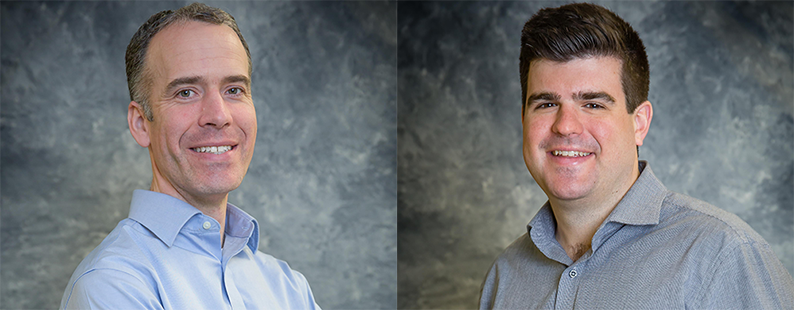Two CSU Professors Earn Prestigious NSF Award
Eric Schearer, Chris Wirth honored for research efforts

Two Cleveland State University faculty members have been selected to receive one of the National Science Foundation’s most prestigious honors. Engineering professors Eric Schearer and Chris Wirth have both been named winners of the CAREER Award, the highest recognition NSF gives to early-career faculty. The awards include a multi-year grant to be used to advance innovative research, while also providing mentoring and training to assist in developing the next generation of higher education leaders.
“The NSF CAREER program is highly competitive and only awarded to the top early-career researchers in the nation,” says Dr. Ronald M. Berkman, president of Cleveland State University. “This announcement exemplifies the excellence and dedication of our faculty, and I would like to personally congratulate Professors Schearer and Wirth for this tremendous accomplishment.”
“This recognition from NSF also highlights the growth and increased national prominence of CSU’s overall research enterprise,” adds Dr. Jerzy Sawicki, vice president for research at Cleveland State. “Drs. Schearer and Wirth are both conducting novel research that will have significant positive impacts for our region and society as a whole, and these awards will greatly expand their efforts.”
Schearer, an assistant professor of mechanical engineering, will work to develop a functional electrical stimulation (FES) system for neuroprosthetic devices. The technology will better control muscle stimulation to restore reaching movements for people with paralyzed arms due to spinal cord injuries. It will also allow a non-expert to update FES settings based on muscle development and the needs of the patient. The project will also include the creation of an empathy training program for rehabilitation engineers to improve understanding of the needs of people with paralysis and other disabilities. He will receive $550,000 for the five-year project.
“The continued expansion of assistive devices requires both improved technology and enhanced training for engineers,” adds Schearer. “This project will seek to meet both of these goals by developing novel FES applications to improve the usefulness of neuroprostheses, while also increasing empathy among engineers which will improve the design and ultimate use of the devices they create.”
Wirth, an assistant professor of chemical and biomedical engineering, will lead a project to better measure the motions and forces that arise in a concentrated suspension of nanoparticles. The research seeks to transform our understanding of how nanoparticles of complex shape or surface chemistry interact during the processing of coatings, production of complex fluids, and in synthetic and biological active colloids. He will receive $500,000 for the five-year effort.
“The continued advancement of the coatings and advanced materials industries requires better measurement of these novel nanoparticles and better understanding of how they interact and impact microstructure formation,” Wirth says. “This research will utilize innovative imaging technology to provide more accurate analysis and ultimately lead to the development of more efficient production techniques.”
“Eric and Chris are tremendous researchers, engineers and educators,” notes Dr. Anette Karlsson, dean of the Washkewicz College of Engineering at CSU. “Eric’s work will be essential to improving the quality of assistive devices for individuals with paralysis and other disabilities, while Chris’ efforts will enhance applications for nanotechnology which will be essential to advances in numerous fields from manufacturing to energy to medicine.”
The Faculty Early Career Development (CAREER) Program was created by the National Science Foundation in 1994. It honors individuals who are working on cutting–edge scholarship with significant societal impact who also have the potential to serve as academic role models in research and education in their institutions and nationally. For more information about the program, visit https://www.nsf.gov/funding/pgm_summ.jsp?pims_id=503214.
###